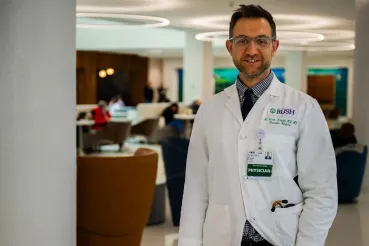As a little girl growing up in Chicago, Lynne Braun loved playing school with her dolls and dreamed of becoming a teacher.
But at 16, her father's death from colon cancer changed her perspective.
"I felt helpless, and I didn't want to feel that way again if a loved one became ill, so I decided to become a nurse," said Braun, who will receive the American Heart Association's highest volunteer honor — the Gold Heart Award — during its annual National Volunteer Awards ceremony June 22.
Raised by hardworking parents with no college education, Braun said attending college was an expectation she embraced. After graduating from high school, she enrolled in a nursing diploma program at a local hospital. Then, she obtained bachelor's and master's degrees in nursing.
Still, the desire to teach kept tugging at her heart.
So Braun applied to Rush University Medical Center, then one of the few hospitals with a practitioner-teacher model in nursing. She joined the faculty in 1980 as a specialist in cardiovascular nursing, enabling her to care for patients and instruct students — an opportunity historically available only to physicians. After more than 39 years in nursing, Braun retired from Rush, but has volunteered at the medical center during the pandemic, notably helping to administer vaccine.
Early on, to continue teaching at the university level, she completed a Ph.D. in nursing science at the University of Illinois–Chicago. The curriculum included mentorship in research careers, which led to collaborations on clinical trials funded by the National Institutes of Health.
"My first boss at Rush said to me and other new faculty members: 'When you leave at the end of the day, your work is not done. I expect you to go out into the community and make a difference,' " she said.
Braun answered that challenge — asking how she could help the AHA, which invited her to join its speakers' bureau.
"They sent me to address different community and church groups about heart health, blood pressure management, nutrition and exercise," she said. "These groups usually were in under-resourced, predominantly Black communities of Chicago that face a disproportionate disease burden due to social and economic disparities."
Connecting people with purpose
For 41 years, Braun has been a volunteer leader at every level of the AHA — serving on and leading committees; co-authoring scientific statements, policy statements and practice guidelines; chairing the Council on Cardiovascular and Stroke Nursing in 2011-13; and presiding over the Midwest Affiliate board in 2019-20.
Notably, she and cardiologist Annabelle Volgman, MD, co-founded the Women's Legacy Luncheon in Chicago — a forerunner to the AHA's national Go Red for Women movement, which raises awareness and research funding to advance women's heart health. They also co-founded the Rush Heart Center for Women in 2003 to address the disparate impact of cardiovascular disease in women.
"When Annabelle and I established the Rush Heart Center for Women, heart disease was still thought of as a man's disease," she said. "However, we observed that significantly more women than men were dying of cardiovascular disease."
Women in their cardiology practice reported receiving little information from prior health care professionals about the unique symptoms of heart disease in women, heart health management and risk factor prevention. In some cases, their symptoms were wrongfully attributed to anxiety.
"By the time they were diagnosed, their conditions were advanced," Braun said. "Further complicating their care was the fact that few women were included in clinical trials at that time. We knew we needed to do something."
Go Red and the Heart Center for Women aside, Braun said her favorite AHA memory is participating in Lobby Day on Capitol Hill for the first time in the early 2000s. Staff and volunteer participants divided into groups by state and visited their respective lawmakers to advocate for the AHA's priority issues around health and well-being.
"My group included three chiefs of cardiology from Chicago, including a former AHA president," she said. "All day, I had just been taking it all in and throwing out comments here and there. Then, at the end of the day, when we were scheduled to see the last lawmaker, they turned to me and said, 'OK, Lynne, this is your meeting.'"
That surprise pivot was just the jolt this self-described introvert needed for her advocacy work with the AHA. She is past chairperson of the AHA's Illinois Advocacy Committee and a past member of the Advocacy Coordinating Committee.
Among her national roles, she's especially proud of serving as chairperson of the Council on Cardiovascular and Stroke Nursing.
"What I loved about being chairperson was providing opportunities for nurses across the country to get involved with the AHA at the national level," she said. "I'm a connector and I enjoy talking with nurses about their interests, then putting them in touch with the appropriate staff person."
Braun said she is "thankful for this gift God has given me to serve others." And receiving the Gold Heart Award is a humbling opportunity to honor the unsung.
"I'm accepting this award on behalf of all the nurses who have been instrumental to the AHA," she said. "Some are clinicians, educators and scientists — all are invaluable."




